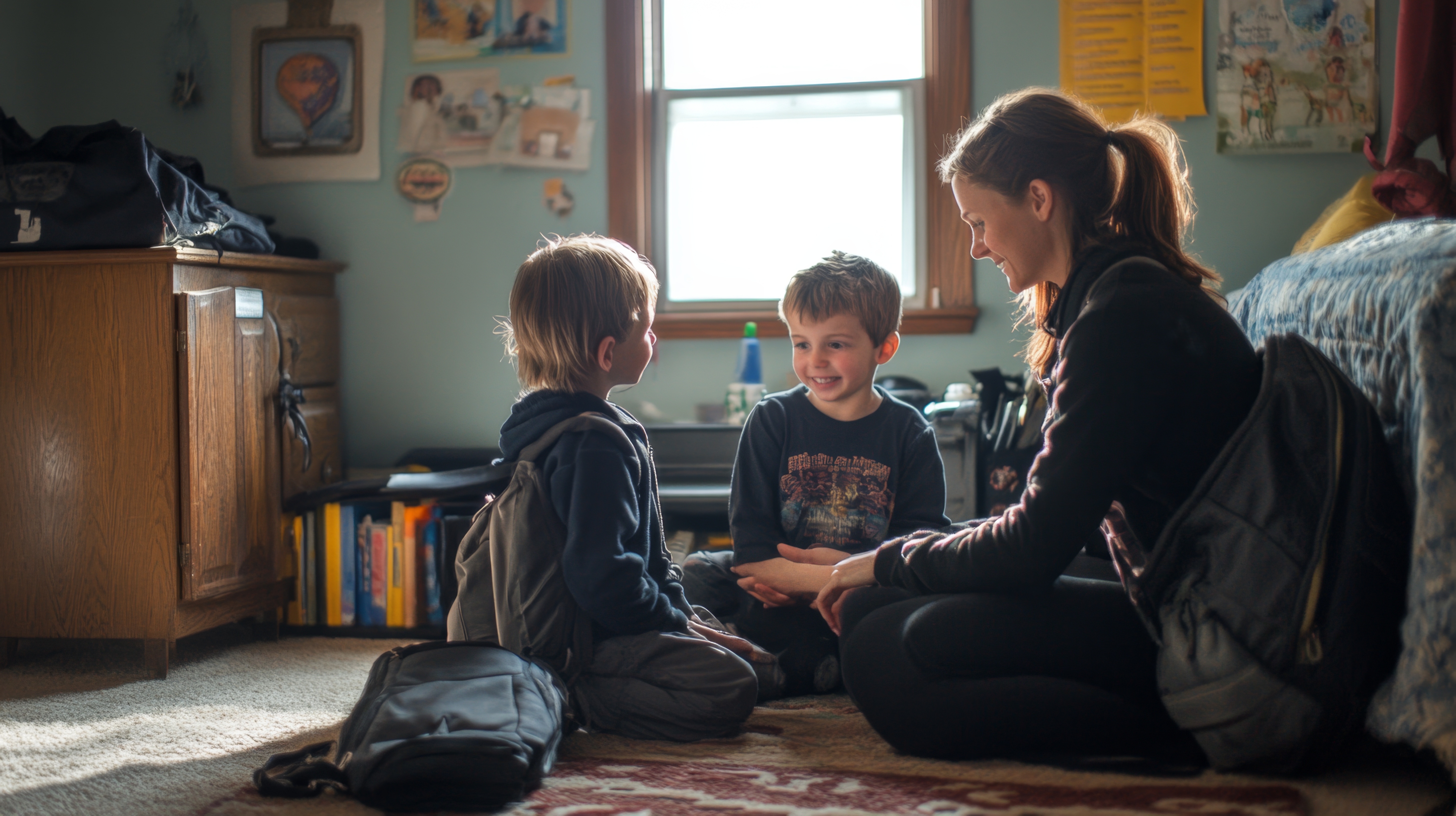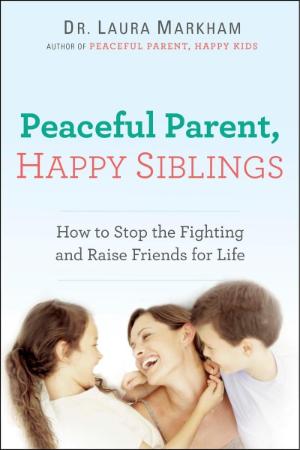
Emotion Coaching is the process of teaching children about emotions, both their own and those of other people. It enables us to befriend our emotions so we can regulate ourselves better, it helps us get along well with other people and work through conflict so we can problem-solve about a situation, and it allows us to get our needs met in a healthy way.
You may be wondering what Emotion Coaching has to do with sibling fighting. Aren't they simply arguing over something silly like the TV remote - again?! Many parents assume that over time siblings will eventually learn to relate to to each other in a loving and generous way. After all, you don't see many adults wrestling each other to the ground to watch their preferred TV show.
But, research has shown that without explicit guidance, siblings don't necessarily learn how to interact in a prosocial manner, especially when tempers get hot. What's more, they will often continue to relate to each other with underdeveloped social skills well into their teen years. These kinds of interactions can erode the sibling bond and build up resentment and animosity that can linger for life.
By contrast, when parents support their children to develop emotional intelligence skills to manage big emotions, empathize with each other, and navigate disagreements, the sibling relationship improves, because the siblings have the skills to work through the inevitable difficulties of human relationships. Positive interactions increase, and their relationship sweetens and deepens, giving them a lifelong foundation of communication and trust.
Happily, any parent can help their children develop the social and emotional intelligence skills that will strengthen every relationship in their future -- and there is no better training ground than with their siblings! Here's how.
1. Empathize with your kids' feelings about each other, but set definite limits on their actions.
Kids are entitled to their feelings, which have a way of showing up in human beings, like our arms and legs. But all humans, even little ones, should be held responsible for what they do with their arms and legs and feelings.
"When your brother messes with your things you get really angry. You can tell him how it makes you feel in words. No hitting."
"You wish you could stay up half an hour later, like your sister. I know you can't wait until you're in third grade, so you'll be able to stay up later too. In the meantime, you can tell me if you're jealous of your sister, but you can't mess up her room."
2. Brainstorm with your kids about how to resolve conflicts peacefully:
For instance:
- “Say what you need or want without attacking the other person."
- "Listen to what the other person says and repeat it to show you heard."
- “Stay respectful.”
- “Stay in the current issue, don’t bring up past conflicts.”
Post the list on the fridge and model referring to it.
3. Teach kids healthy self-calming techniques
...which can be a challenge. Most of us never learned to regulate our own emotions as kids, so these are skills we don't necessarily model so well. Sometime when they're calm, make a game out of working with your kids on a list of healthy ways to calm themselves when they're angry, so they can then have a civil discussion and work things out. For instance:
- "Play the drums."
- "Write in your journal about how angry you are."
- “Dig a hole in the back yard and bury your angries.”
- “Breathe and count backwards from 10.”
- “Get a grownup.”
- "Put on headphones and dance to loud music."
- "Kick the soccer ball outside."
Post that list on the fridge also, and refer to it when you’re mad, in front of them, to model using it.
4. Expressing emotion verbally is the first step in managing it.
As you go through daily life, notice your kids’ emotions and experiences and acknowledge them, non-judgmentally.
- “No wonder you're angry! It’s so frustrating when you work hard on something and it collapses like that.”
- “This day really isn't going the way you wanted, is it?”
- "It sounds like you really miss your friend.”
Don’t feel like you need to solve their problems or talk them out of their feelings, just acknowledge the feelings so they can, too.
5. Teach your kids that anger always has a message.
Maybe that message is that their sibling trespassed a boundary, either materially (breaking their toy) or emotionally (disrespecting them.) The anger is defending them from this trespass and from the underlying hurt, powerlessness, sadness, etc. Acknowledging the underlying feelings is always more effective to diffuse anger than simply labeling the anger, which just seems to reinforce it.
“I hear you’re very angry at Jimmy. It could really hurt to have him say that your idea was stupid.”
This is even more important when kids say "I hate her!" because hate is not a feeling; it's a stance--a position we take that says we refuse to connect and work things through.
"You feel so angry at your sister right now that you feel like you hate her and you never even want to work things out with her. Sometimes when we are very, very angry, we feel that way, even toward people we love. Let's go tell your sister how hurt you are that she punched you, and how angry that makes you feel."
6. Encourage the development of empathy.
Encourage your child's understanding of, and comfort with, other people's emotions by wondering aloud about other kids’ feelings:
- "Look at Michael. He's crying. I wonder if his feelings are hurt.”
- “That little girl is sure mad. I wonder why?"
- "Keisha hurt herself. I wonder if we can do anything to help her feel better?"
Most important, offer your kids empathy for their own feelings, which is the foundation of their developing empathy for each other.
"When your son and daughter are fighting with each other, you want them to learn to resolve their differences successfully, but you may have never learned to successfully work through conflicts yourself. Before you can teach your kids to listen, identify the problem, express their feelings, generate solutions, and find common ground, you have to learn those problem-solving skills yourself."
-Laura Davis & Janis Keyser
Do you have more questions about raising brothers and sisters who love and support each other? Get your hands on Dr. Laura's new book: Peaceful Parent, Happy Siblings: How to Stop the Fighting and Raise Friends for Life.
"Your first book, Peaceful Parent, Happy Kids, is invaluable. But Peaceful Parent, Happy Siblings takes it to the next level and makes it all come alive so vividly. The scripts are so helpful and make it all so real. There's a great overview/explanation of how family emotions work and how you, as the parent, are the model and coach. I love the list of what children learn when parents allow the child's feelings and respond with empathy! This book is absolutely phenomenal!" - Beth, mother of two.
"This book delivers hope and help. Laura Markham brilliantly applies her respectful, attuned, limit-setting approach to sibling dynamics. Full of realistic scenarios and scripts for how parents can turn conflict into opportunities to build skills, and turn parental dread into meaningful intervention. Peaceful Parent, Happy Siblings masterfully coaches parents on how to honor each child's experience, set limits, reduce conflict, and build skills for life." - Tina Payne Bryson, PhD, co-author of The Whole-Brain Child and No-Drama Discipline






